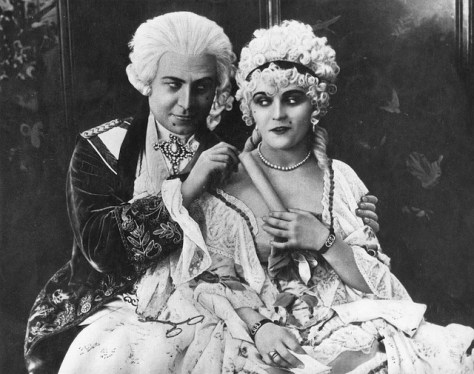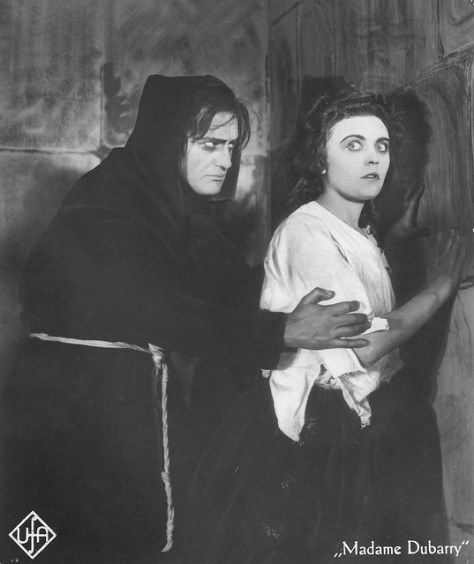
Pola Negri’s Madame Dubarry has it. You know exactly what I am talking about. Dubarry is living and loving in the heat of pre-revolutionary Paris, but she’s more than enough trouble for the aristos all by herself. “The woman who will ruin France” is first introduced as a breath of fresh air, whispering saucy jokes to the other girls in the seamstresses’ workroom – a ripple of fun in the stuffy atmosphere of the atelier. When she leaves the shop, Dubarry collects admirers with every step, like Clara Bow in a crinoline. Before long, of course, she’s the mistress of Louis XV, creating disarray in the court, just as she did in the shop.
Ernst Lubitsch is brilliant at capturing this, the sizzle of sex appeal so hot that it can turn a king’s head, transform a society ball into an orgy, or raise an angry mob at the palace gates. Madame Dubarry has the angst of a drama, but the vigour of a comedy, and Negri has exactly the attitude that the part demands. Dubarry isn’t a calculating seductress, just a natural-born pleasure-seeker: a minx who decides which lover to visit by pouting as she pulls at the bows on her bodice. And Negri commits fully to the role of a beautiful woman in ugly circumstances – those enormous eyes are flirting one moment and filled with anguish the next. Some people are allergic to Negri’s grand emoting, the head flung back, the flailing arms. But there’s plenty there’s naturalistic and light here: watch her face as Jannings trims her fingernails, revelling in pleasure and pain. And yes, there’s also an opportunity for Negri to rehearse her most notorious scene – hysterically throwing herself across her lover’s coffin.

This Ufa production was an important film for Lubitsch and Negri both; retitled Passion to sound less alarmingly foreign, Dubarry was released in the US and captivated the critics (Mordaunt Hall acclaimed it: “one of the pre-eminent pictures of the day”). So much so that Hollywood beckoned for both director and star within a year. Negri’s co-star, Emil Jannings, who plays the dim-but-determined king, followed them soon after. Madame Dubarry may not be the best-remembered work of the Lubitsch-Negri-Jannings trio but the more I watch it, the further it seeps under my skin. These three have real chemistry.

Lubitsch once said that he gave up on acting himself when he saw Negri and Jannings perform together. Arguably his direction was part of what made them gel, but for a chance to see Lubitsch act, this dual-format release contains an archive gem. Als Ich Tot War, from 1916, is Lubitsch’s earliest surviving work, in which a henpecked hubby fakes his own death (in spite at his mother-in-law, of course) and then sneaks back into the household as a butler. It’s ragged, and a little static, but wickedly jovial. Lubitsch plays against his own preference, as a rather straight middle-class nobody rather than the broad Jewish “types” he commonly portrayed. It’s a wisp of thing compared with Dubarry, but worth it for a bizarre potato-peeling scene alone. Lubitsch was a great director, but a middling actor, and on this evidence, a rotten sous-chef.

But back to the main event – this film is not all about its star turns. Lubitsch’s crowd scenes are always a marvel, and the ones in Madame Dubarry are especially strong. Whether he is filling the frame with bewigged courtiers or raging peasants, Lubitsch understands the power that a mass of people can command: his crowds have character, and they bring the film to life. The revolutionary who pauses to slash a painting amid a palace raid, the jostling Parisians eager to gawp at the King’s envoy, the execution scene glimpsed through a jail-window grille. If Dubarry were a chamber romance, it would be striking, but the story Lubitsch is telling is bigger than that: of how the actions of lusty kings and greedy girls have far-reaching consequences. “All this because of a mistress!” So no matter how sumptuous the sets and how beautiful the gowns, it’s the drama that catches our eye. The sequence in which Madame Dubarry is presented at court, for example, is simply immaculate. As David Cairns writes in an insightful essay that accompanies this disc:
“[Lubitsch] succeeded most perfectly in humanising the denizens of the past, showing that the foibles that make modern man so ridiculous were just as evident in bygone ages. Though not a comedy, the movie uses comic declension to take the mickey out of kings and politicians and the great movements of history, showing the kind of bickering which lies behind them.”

Lubitsch’s film has the glamour and sweep of a historical drama as well as the intimacy of a romcom. The sets and costumes are gorgeous, the very best that Ufa’s ample resources could provide. The Blu-ray transfer here is crisp and brightly tinted – streets ahead of other versions I have seen – so while there are some marks of wear-and-tear, the image is clear and detailed. Presented this way, Madame Dubarry is a film to wallow in on a rainy afternoon: a concoction of sex and violence, politics and tragedy. It repays multiple viewings, and that’s why I’m a little disappointed that there is no audio commentary on this disc and fewer extras than we’ve come to expect from Masters of Cinema packages. It’s a small gripe however – this is a disc to treasure.
Madame Dubarry is released by Masters of Cinema on dual-format DVD and Blu-ray on 22 September 2014, priced £14.99. Read more here.

The intertitles are ghastly. They ruin the beautiful images of an otherwise excellent copy. They are in flashy green, too big, and are in German and French!!! There is an option with English subtitles together with the German and French. Some philistine at Eureka wanted to kill three birds with one stone. This is the worst copy of a silent movie I’ve seen.
Only comments praising this blu ray with subtitles made by the philistine IBF will be allowed on air.
Are you complaining about censorship because I didn’t wake up in the middle of the night to approve your comment?